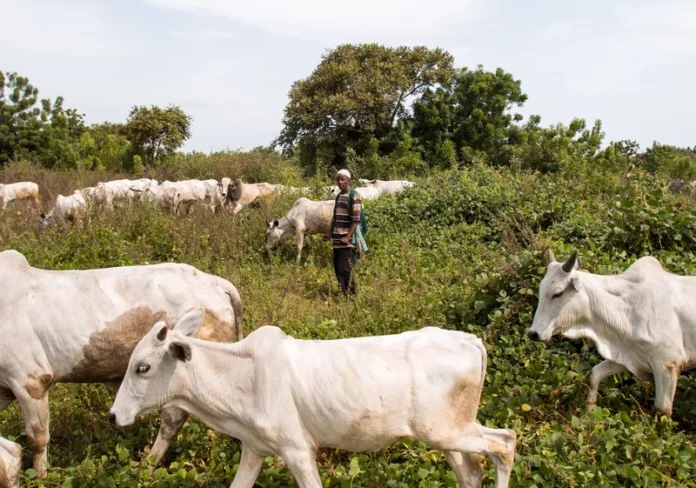The Federal Government has dismissed reports claiming that open grazing has been banned across Nigeria, describing the information as false and misleading. The clarification was issued on Tuesday by the Minister of Livestock Development, Idi Maiha, during a briefing in Abuja.
Maiha, who heads the newly created Ministry of Livestock Development, said the government has not announced any policy that stops open grazing nationwide. Instead, he explained that the administration is implementing a “phased and well-structured transition” from open grazing to modern ranching systems across the country.
According to him, the goal is to move Nigeria’s livestock sector toward a more organised and productive system, but without creating sudden disruptions that could affect pastoralists, farmers, and food supply.
“Reports that the Federal Government has banned open grazing are not true,” the minister said. “The transition plan does not outlaw open grazing abruptly. What we are doing is creating viable alternatives that will enhance productivity, reduce conflicts, and support a modern livestock economy.”
Maiha’s statement comes at a time when public debate around open grazing has grown intense. Many Nigerians believed a nationwide ban was imminent following recent discussions on ranching, grazing reserves, and the rising cases of farmer–herder conflict in different states.
Several social media posts and commentaries had claimed that the Federal Government had secretly enforced a ban, but the minister insisted that such claims were completely false.
The minister provided new details about the government’s livestock plans, revealing that Nigeria currently has 273 gazetted grazing reserves, covering more than 4.5 million hectares of land across the country.
These grazing reserves were established decades ago under various military governments to provide designated areas for herders and reduce movement from place to place. However, many of the reserves have been abandoned, poorly managed, or overtaken by farming activities because they were never fully developed.
Maiha said the current administration aims to change that.
“The Federal Government is partnering with state governments to rehabilitate and equip the reserves to make them fully functional for pastoralists and livestock operators,” he said. “Pastoralists, like every other economic group, require a structured business environment. The grazing reserves provided by law are meant to serve as business premises for all livestock activities.”
He said the ministry will work with states, local governments, and private investors to build basic infrastructure in the reserves, including water sources, veterinary clinics, pasture development, security posts, and access roads.
Nigeria’s livestock sector has been under pressure for years due to population growth, shrinking grazing land, expanding farmlands, and climate change. The combination has fueled frequent clashes between farmers and herders in many parts of the country, resulting in deaths, loss of property, and displacement of entire communities.
Open grazing, in which herders move cattle across states in search of pasture and water, has also become more difficult because many routes used decades ago are now occupied by villages, farms, and roads.
The minister’s statement appears aimed at balancing these concerns: offering long-term reform without forcing immediate changes.
Maiha stressed that the government’s approach will be gradual so that both farmers and herders can adjust in a peaceful and organised way.
“This transition is about creating a sustainable environment where livestock owners can thrive and where farmers can work without fear of attacks or cattle encroachment,” he said. “We want a system that improves meat and milk production, increases jobs, and protects communities.”
He added that the new ministry is already working on a national livestock roadmap that includes ranching models adapted to different regions. These ranches will vary in size and structure depending on land availability, local needs, and cultural practices.
In some states, pilot ranching projects are already being developed under a partnership between the Federal Government, state governments, and private businesses interested in the livestock industry.
The minister urged Nigerians to disregard unverified reports on grazing policies and rely only on official government communications.
“There is too much misinformation on this topic,” he said. “We want Nigerians to receive accurate updates so they understand what the government is planning. People should not panic or assume that open grazing has been banned.”
He added that the ministry will continue to engage pastoralist associations, farmer unions, traditional rulers, and state governments to explain the transition process and address concerns.
The issue of open grazing has been debated for many years in Nigeria. Several southern states passed anti-open-grazing laws between 2021 and 2022, arguing that ranching was the only sustainable way to reduce insecurity and protect farms.
In the North-Central and parts of the North-West, violent clashes between farmers and migrating herders have strained relations between ethnic groups and added to the country’s insecurity challenges. Communities in Benue, Plateau, Nasarawa, Kaduna, and Taraba states have experienced repeated confrontations linked to grazing routes, farmland encroachment, and cattle rustling.
At the federal level, past administrations introduced various programs aimed at reforming livestock production, including the National Livestock Transformation Plan (NLTP). However, implementation has been slow, often due to disagreements between the federal and state governments, funding issues, and mistrust among local communities.
The creation of the Ministry of Livestock Development earlier this year signaled a renewed effort to address these long-standing problems.
With rising food prices, insecurity in rural areas, and increasing national demand for dairy and meat products, many Nigerians believe livestock reforms are long overdue. Analysts say proper ranching, if well managed, could help boost the agricultural economy, create jobs, and reduce rural violence.
However, they warn that any transition must be carefully handled to avoid confusion, resistance, or political tension.
Maiha assured Nigerians that the Federal Government is committed to a peaceful and inclusive process.
“Our priority is to ensure stability and growth in the livestock sector,” he said. “We will continue to engage all stakeholders until we achieve a modern system that benefits everyone.”

